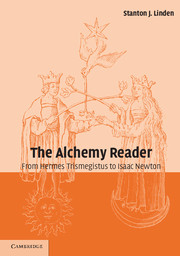Book contents
- Frontmatter
- Contents
- List of illustrations
- Acknowledgments
- List of abbreviations
- Illustrations
- Introduction
- Part I Ancient texts
- Part II Islamic and medieval texts
- Part III Renaissance and seventeenth-century texts
- 18 PARACELSUS (1493–1541): From Of the Nature of Things and Paracelsus His Aurora
- 19 FRANCIS ANTHONY (1550–1603): Aurum-Potabile: or the Receit of Dr. Fr. Antonie
- 20 MICHAEL SENDIVOGIUS (1566–1636 or 1646): From A New Light of Alchymie and A Dialogue between Mercury, the Alchymist and Nature
- 21 ROBERT FLUDD (1574–1637): From the Mosaicall Philosophy
- 22 GABRIEL PLATTES (first half of seventeenth century): A Caveat for Alchymists
- 23 JOHN FRENCH (1616?–1657): Preface to The Divine Pymander of Hermes Mercurius Trismegistus in XVII Books
- 24 GEORGE STARKEY/EIRENAEUS PHILALETHES (1628–1665?): The Admirable Efficacy, and almost incredible Virtue of true Oyl; From An Exposition Upon Sir George Ripley's Epistle to King Edward IV
- 25 ELIAS ASHMOLE (1617–1692): From the “Prolegomena” to the Theatrum Chemicum Britannicum
- 26 ROBERT BOYLE (1627–1691): From An Historical Account of a Degradation of Gold Made by an Anti-Elixir: A Strange Chymical Narative
- 27 SIR ISAAC NEWTON (1642–1727): The Key (Keynes MS 18); The Commentary on the Emerald Tablet (Keynes MS 28)
- Glossary
- Bibliography
- Index
24 - GEORGE STARKEY/EIRENAEUS PHILALETHES (1628–1665?): The Admirable Efficacy, and almost incredible Virtue of true Oyl; From An Exposition Upon Sir George Ripley's Epistle to King Edward IV
Published online by Cambridge University Press: 05 October 2014
- Frontmatter
- Contents
- List of illustrations
- Acknowledgments
- List of abbreviations
- Illustrations
- Introduction
- Part I Ancient texts
- Part II Islamic and medieval texts
- Part III Renaissance and seventeenth-century texts
- 18 PARACELSUS (1493–1541): From Of the Nature of Things and Paracelsus His Aurora
- 19 FRANCIS ANTHONY (1550–1603): Aurum-Potabile: or the Receit of Dr. Fr. Antonie
- 20 MICHAEL SENDIVOGIUS (1566–1636 or 1646): From A New Light of Alchymie and A Dialogue between Mercury, the Alchymist and Nature
- 21 ROBERT FLUDD (1574–1637): From the Mosaicall Philosophy
- 22 GABRIEL PLATTES (first half of seventeenth century): A Caveat for Alchymists
- 23 JOHN FRENCH (1616?–1657): Preface to The Divine Pymander of Hermes Mercurius Trismegistus in XVII Books
- 24 GEORGE STARKEY/EIRENAEUS PHILALETHES (1628–1665?): The Admirable Efficacy, and almost incredible Virtue of true Oyl; From An Exposition Upon Sir George Ripley's Epistle to King Edward IV
- 25 ELIAS ASHMOLE (1617–1692): From the “Prolegomena” to the Theatrum Chemicum Britannicum
- 26 ROBERT BOYLE (1627–1691): From An Historical Account of a Degradation of Gold Made by an Anti-Elixir: A Strange Chymical Narative
- 27 SIR ISAAC NEWTON (1642–1727): The Key (Keynes MS 18); The Commentary on the Emerald Tablet (Keynes MS 28)
- Glossary
- Bibliography
- Index
Summary
From the start, George Starkey's career has been marked by controversy and uncertainty. Born in Bermuda and holder of BA and MA degrees from Harvard College, Starkey (or Stirk) practiced medicine for a time in America before relocating to London about 1650; there he became active in the scientific circle of Samuel Hartlib and an associate of Robert Boyle. At some point, probably before his arrival in England, he began to promote the work of a mysterious adept who wrote under the pseudonym “Eirenaeus Philalethes,” with whom Starkey is usually, but not universally, identified. He published prolifically under both names until the time of his death, which perhaps resulted from exposure during the Great Plague of London. Publications continued to be issued under his name even after his death, and his influence on the development of chemistry is reflected in positive references by both Boyle and Newton.
Starkey's orientation toward healing and the formulation of new medicines is Paracelsian and iatrochemical (he often styles himself a “Philosopher by Fire”), and he was thus deeply engaged in disputes that were part of the politics of medicine in the seventeenth century. For example, an argumentative edge is often present even in the titles of his works, as in Pyrotechny Asserted and Illustrated, to be the surest and safest means for Arts Triumph over Natures Infirmities (1658). In the Admirable Efficacy … of true Oyl, reprinted below, Starkey argues for his own special formulation of this chemical medicine, in opposition to the false claims of his competitors.
- Type
- Chapter
- Information
- The Alchemy ReaderFrom Hermes Trismegistus to Isaac Newton, pp. 211 - 221Publisher: Cambridge University PressPrint publication year: 2003



